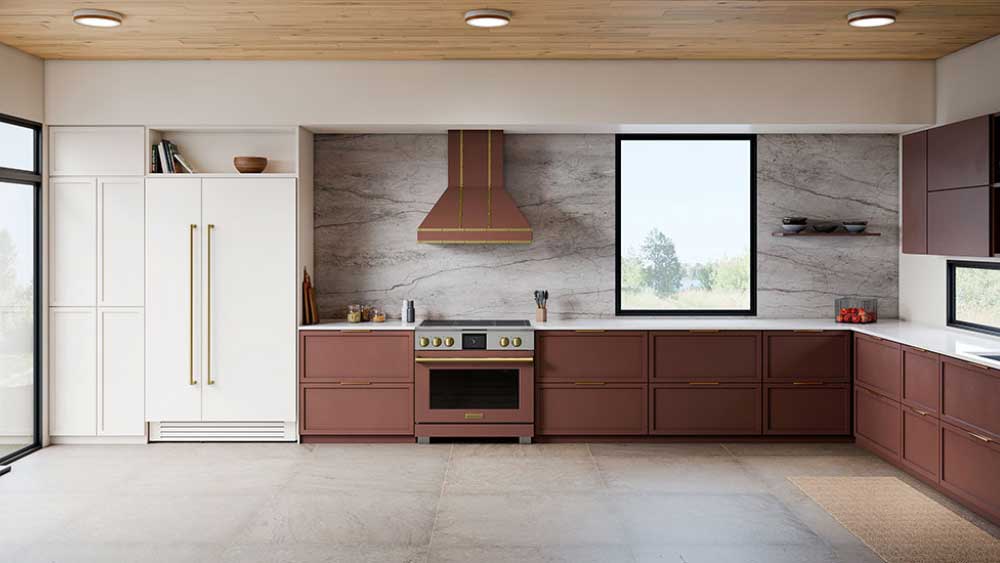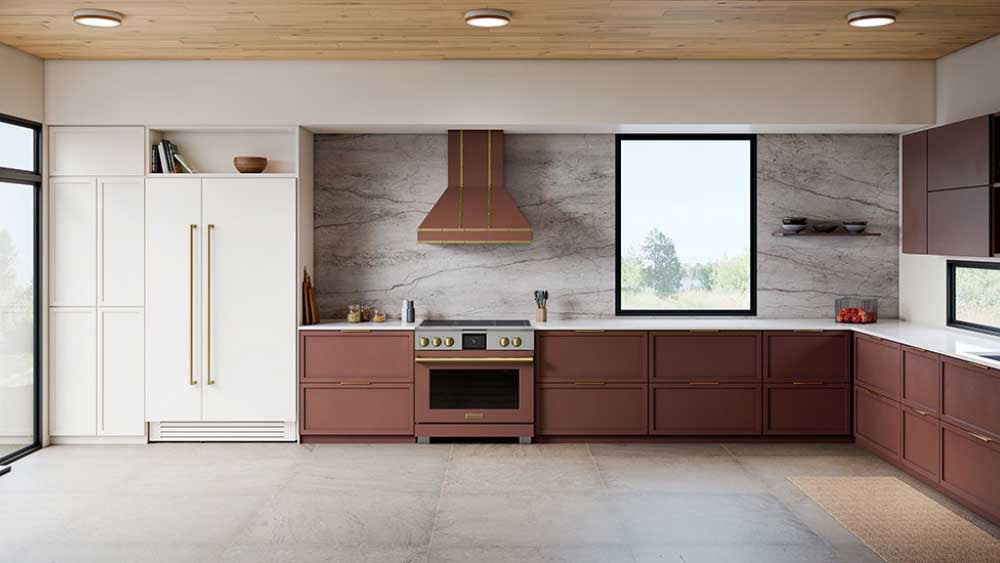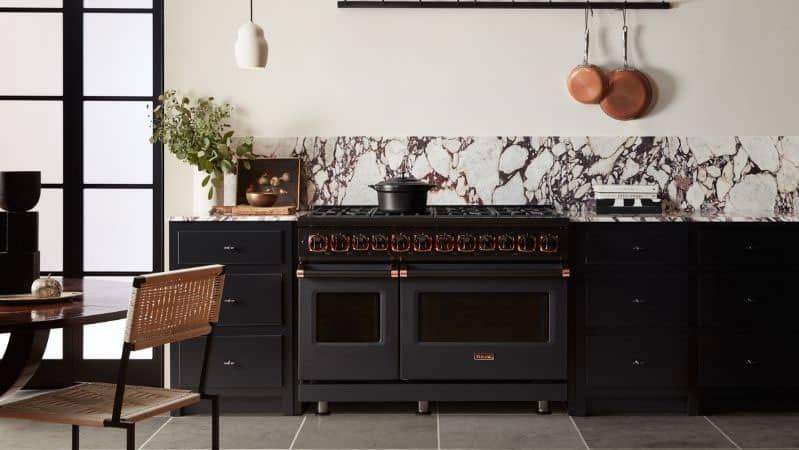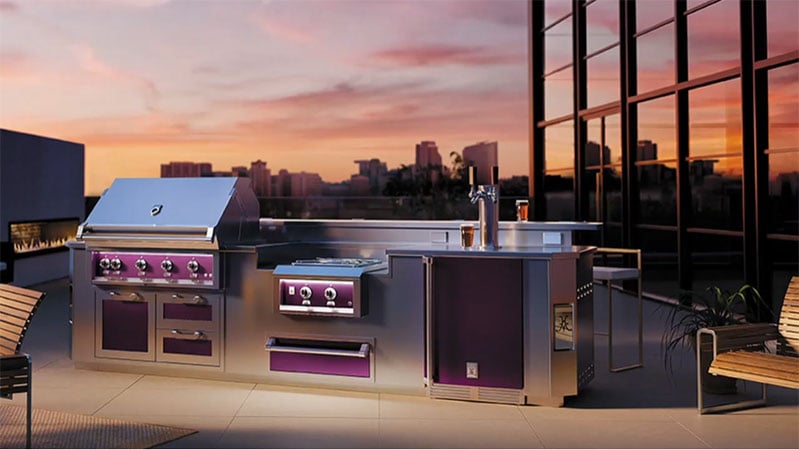July 30th, 2025 | 17 min. read
International Brands That Manufacture Appliances in the U.S.
Not every appliance brand made in the U.S. is American‑owned.
Several global manufacturers have invested heavily in U.S. factories to serve the North American market.
While the profits may go overseas, the jobs and production stay here.
These companies often build their most in‑demand products in the U.S., especially larger washers, dryers, and dishwashers that suit American preferences.
Bosch, Thermador, and Gaggenau (BSH Corporation)
.jpg?width=799&height=450&name=Thermador-Built-In-Refrigerator-Kitchen-Installation-with-Custom-Cabinets-(1).jpg)
Bosch’s North Carolina plant is the largest dishwasher manufacturing facility in the world, employing thousands and producing millions of units each year.
Thermador, BSH’s luxury line, produces most of its cooking appliances in the U.S., including wall ovens and pro ranges.
Bosch, Thermador, and Gaggenau are part of BSH, a German‑owned company with major manufacturing operations in the U.S.
Bosch is best known for its dishwashers. Some cooking products are also made in the U.S., but most refrigerators are imported from China and Turkey.
Starting in 2024, top‑end CrystalDry dishwashers will shift production back to Germany.
Thermador’s speed ovens are built in China, and its refrigerators come from Turkey.
Gaggenau, the ultra‑premium brand in the BSH portfolio, is designed and engineered in Germany, with most products assembled in France.
Gaggenau appliances are not built in the U.S. but are sold here through the Bosch‑Thermador distribution network.
Pros
✔️Strong U.S. investment from Bosch and Thermador
✔️Industry‑leading dishwasher technology
✔️High‑end design and performance, especially from Thermador and Gaggenau
✔️Bosch dishwashers are a favorite for quiet operation and energy efficiency
Cons
❌Refrigerators and speed ovens are imported
❌Gaggenau appliances are not made in the U.S.
❌CrystalDry dishwashers are moving out of U.S. production
LG

LG is a South Korean company that has made a significant manufacturing push into the U.S.
In 2019, it opened a massive factory in Clarksville, Tennessee, where the company now builds full‑size washers and dryers for the North American market.
About 30 percent of LG’s electric ranges for the U.S. are also produced in that facility. Refrigerators, dishwashers, and microwaves are still imported, mostly from Korea and China.
📍Local Insight: LG washers are frequently requested in our showrooms, especially by families seeking large capacity, efficiency, and reliability.
Pros
✔️U.S. factory builds many of the brand’s most popular laundry products
✔️Known for innovative features and modern styling
✔️Consistently strong reliability in laundry and refrigeration
✔️Competitive pricing with premium features
Cons
❌Refrigerators and dishwashers are still imported
❌Some models can be overly complex for basic users
❌Service availability can be inconsistent depending on location
Samsung

Samsung is a South Korean company that has become one of the biggest appliance brands in the U.S.
In 2018, it opened a large factory in Newberry, South Carolina, where it now manufactures full‑size washers and dryers for the North American market.
Most of its other appliances, including refrigerators, ranges, and dishwashers, are still produced in Korea or China.
📍Local Insight: Samsung had fulfillment issues during the pandemic. You will see Samsung primarily in big‑box stores.
Editor’s note: Make sure Samsung can be fixed in your area before you buy.
Pros
✔️U.S.-built washers and dryers
✔️Modern styling and innovative features
✔️Competitive pricing with strong promotion cycles
✔️Consistently high capacity in laundry and refrigeration
Cons
❌Refrigeration, cooking, and dishwashing products are mostly imported
❌Service network can be inconsistent
❌Complex controls and electronics can be harder to troubleshoot
GE Appliances (Owned by Haier)

GE has been a household name in American appliances for over a century.
Most of GE’s cooking appliances, full‑size refrigerators, and dishwashers are built in American plants across Kentucky, Georgia, and Tennessee.
While the company is now owned by Haier, a Chinese multinational, it still operates numerous factories in the U.S. Haier has expanded domestic production since acquiring GE in 2016, investing more than $1 billion in new facilities.
Editor’s Note: Though some disliked seeing GE sold to Haier, the acquisition likely saved American jobs.
That said, not everything with a GE badge is made here. Compact laundry units, certain top‑load and front‑load washers, and smaller appliances are still imported.
Pros
✔️Strong U.S. manufacturing footprint across major categories
✔️Wide product range from entry‑level to premium (GE Profile and Café)
✔️Backed by a long history of American innovation
✔️Growing investment in U.S. jobs and production capacity
Cons
❌Some appliances are still imported, especially compact units
❌Reliability can vary depending on the product line
Frigidaire and Electrolux

Frigidaire has deep roots in American manufacturing and is now owned by Electrolux, a Swedish company.
Many Frigidaire appliances are still built in the U.S., including ranges, wall ovens, and refrigerators.
Electrolux‑branded cooking appliances and some front‑load washers are also assembled in American factories.
However, compact washers are imported from Italy, and matching dryers come from Poland. Electrolux’s laundry division has shifted more production to Mexico in recent years.
Pros
✔️Many Frigidaire products are still built in the U.S.
✔️Reliable and affordable cooking appliances
✔️Electrolux offers sleek, European‑inspired design
✔️Large appliance portfolio to fit different budgets
Cons
❌Laundry manufacturing is now mixed among the U.S., Mexico, and Europe
❌Compact appliances are imported
❌Some models have a history of service issues
Sharp

Sharp is a Japanese electronics company with U.S. manufacturing facilities in Memphis, Tennessee.
It pioneered the microwave drawer, now private‑labeled by many luxury brands such as Wolf and Monogram.
📍Local Insight: Sharp microwave drawers are common in high‑end kitchens across Greater Boston.
Even if the badge on your appliance says Wolf or Thermador, there is a good chance it was made by Sharp.
Pros
✔️U.S. production of select microwave models
✔️Industry leader in microwave drawer design
✔️Widely used as an OEM supplier for premium brands
✔️Competitive pricing in the mid‑range category
Cons
❌Most appliances are still imported from Japan or China
❌Limited selection beyond microwave and ventilation products
❌Less brand recognition among full‑kitchen buyers
Dacor (Owned by Samsung)

Dacor was once a proudly American, family‑owned company based in California, known for sleek, modern cooking appliances.
Samsung acquired Dacor in 2016; some manufacturing continues in the U.S., but production is now more limited.
Dacor still positions itself as a premium, design‑forward brand, yet its market presence has shrunk in recent years, and local support can vary.
📍Local Insight: Dacor was once a go‑to choice for upscale kitchen remodels in Boston’s suburbs, but we see fewer buyers asking for it today.
Most customers now favor more established premium brands such as Wolf, Monogram, or Thermador.
Pros
✔️Elegant design and premium finishes
✔️U.S. roots with partial domestic assembly
✔️Strong integration with Samsung smart features
Cons
❌Brand visibility and availability have declined
❌Many parts and components are imported
❌Service and support can be inconsistent
Imported Appliance Brands with No U.S. Manufacturing
Buying American‑owned and American‑made keeps both profits and jobs in the U.S., which matters to many shoppers.
However, in a global economy, imported appliances are nearly unavoidable, especially for niche products, luxury ranges, and compact European designs.
Here are some of the most popular imported brands and where they are manufactured.
AGA

AGA ranges are manufactured in Telford, England, the birthplace of the Industrial Revolution.
Known for their cast‑iron construction and classic styling, AGA ranges have long been staples in traditional British kitchens.
These specialty products have a small but passionate following in the U.S.
Editor’s note: AGA, La Cornue, and CornuFe are owned by the American company Middleby, so buying them still supports a U.S. parent.
Pros
✔️Supports a U.S. parent company (Middleby)
✔️Iconic cast‑iron radiant‑heat ranges with classic styling
Cons
❌Fully imported; no U.S. manufacturing
❌Limited product range appealing to a niche audience
Asko
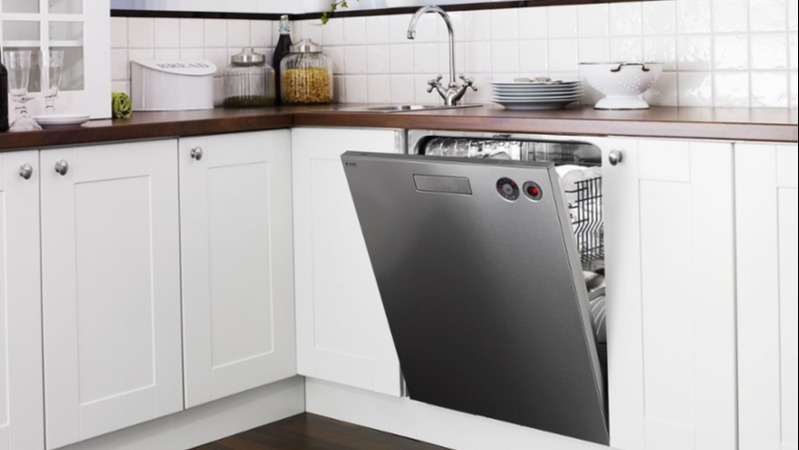
Asko is a Scandinavian brand, known since the 1980s for clean lines and minimalist design.
The company is owned by the Slovenian Gorenje Group, which is in turn owned by Chinese giant Hisense.
Its dishwashers and laundry products are built in Slovenia and other parts of Europe.
Pros
✔️Scandinavian minimalist styling
✔️Premium dishwashers and space‑saving laundry options
Cons
❌Fully imported with no U.S. manufacturing
Beko and Blomberg
.jpg?width=799&height=449&name=Beko-dishwasher-featuring-controls-(1).jpg)
Beko is a Turkish manufacturer and part of the Arçelik Group. In the U.S., its appliances are sold under both the Beko and Blomberg names.
The brand gained traction during the pandemic but now faces stiffer competition.
Beko is best known for compact refrigerators, dishwashers, and affordable full‑kitchen suites.
Pros
✔️Compact, energy‑efficient refrigerators and dishwashers
✔️Budget‑friendly full‑kitchen packages
✔️Increasing availability in U.S. showrooms
Cons
❌Fully imported with no U.S. manufacturing
❌Limited brand recognition compared with larger rivals
❌Service and parts support can be uneven
Bertazzoni

Bertazzoni is a fifth‑generation Italian appliance company based in Guastalla, Italy.
Known for its colorful ranges, Bertazzoni is popular in designer kitchens where aesthetics matter as much as performance.
All products are imported from Italy. Made in Italy, Bertazzoni is best known for stylish gas ranges and full kitchen suites with Italian flair.
Pros
✔️Striking color options and Italian design
✔️Family‑owned heritage with artisanal build quality
✔️Complete kitchen suites for coordinated styling
Cons
❌Fully imported; no U.S. production
❌Smaller service network than established premium brands
❌Higher price point relative to mainstream alternatives
Fisher & Paykel
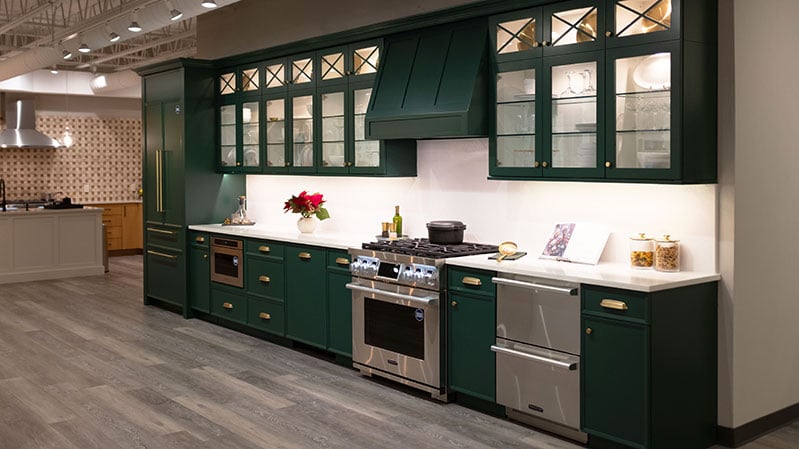
Fisher & Paykel, originally from New Zealand and now owned by Haier, designs its appliances in New Zealand and manufactures them primarily in Thailand, China, and other parts of Asia.
Made in Asia, the brand is best known for its DishDrawer dishwashers, built‑in refrigeration, and sleek cooktops.
Known for innovation, especially in drawer‑style appliances, Fisher & Paykel is expanding its presence in the U.S. luxury market.
Pros
✔️Innovative DishDrawer dishwashers and modular refrigeration
✔️Sleek, minimalist design suited to luxury kitchens
✔️Flexible product line for compact and full‑size spaces
Cons
❌Fully imported with no U.S. manufacturing
❌Service network and parts availability can vary by region
Haier

Haier is a Chinese multinational that owns GE Appliances.
While GE builds many of its products in the U.S., Haier‑branded appliances are imported from China and focus on compact, budget‑friendly options like microwaves and mini fridges.
Pros
✔️Budget‑friendly pricing
✔️Wide range of compact refrigerators and microwaves
✔️Backed by a large global manufacturer with an expanding U.S. service network
Cons
❌Fully imported with no U.S. manufacturing
❌Limited premium features and finishes
❌Service and parts support can vary by region
Hallman

Despite the American‑sounding name, Hallman ranges are designed and assembled in Italy, offering a vintage aesthetic and brass burner options at a more accessible price than some high‑end Italian competitors.
Hallman is best known for custom‑color ranges with European styling.
Pros
✔️Custom‑color ranges with vintage European styling
✔️Brass burner options for pro‑style performance
✔️More affordable than many Italian luxury brands
Cons
❌Fully imported with no U.S. manufacturing
❌Limited product portfolio beyond ranges
❌Service and parts availability can vary by region
ILVE

ILVE is an Italian manufacturer near Venice known for handcrafted ranges that combine old‑world craftsmanship with modern performance.
Best known for its professional‑style ranges, ILVE offers ornate details, unique color options, and traditional European proportions.
Pros
✔️Handcrafted Italian ranges with ornate detailing
✔️Wide array of colors, trims, and customization options
✔️Combines classic aesthetics with modern cooking performance
Cons
❌Fully imported; no U.S. production
❌Premium pricing compared with mainstream brands
❌Smaller service network and parts availability in the U.S.
Gaggenau

Gaggenau is the most premium brand within the Bosch and Thermador family. Although German‑owned, most Gaggenau appliances are manufactured in France.
Known for striking minimalist design and advanced cooking technology, Gaggenau products command some of the highest prices in the industry.
None are made in the United States.
Pros
✔️Ultra‑premium build quality and materials
✔️Advanced cooking technology and precision controls
✔️Distinctive minimalist aesthetics for modern kitchens
Cons
❌Fully imported; no U.S. manufacturing
❌Among the highest price points in the category
❌Limited service network and parts availability compared with mainstream brands
La Cornue
.jpg?width=799&height=449&name=la-conrue-chateau-custom-color%20(1).jpg)
La Cornue is a legendary French manufacturer known for its handcrafted, made‑to‑order ranges.
Each unit is built in France by artisans using techniques more common to custom furniture than appliances.
The company is now owned by Middleby Residential, an American corporation based in Illinois, yet production remains entirely in France.
La Cornue is best known for custom, handcrafted French ranges such as the Château series.
Pros
✔️Bespoke craftsmanship and luxury materials
✔️Iconic Château ranges with extensive customization
✔️Backed by Middleby’s U.S. distribution and service network
Cons
❌Fully imported, with no U.S. manufacturing
❌Extremely high price and long lead times
❌Specialized installation and service requirements
CornuFé (by La Cornue)
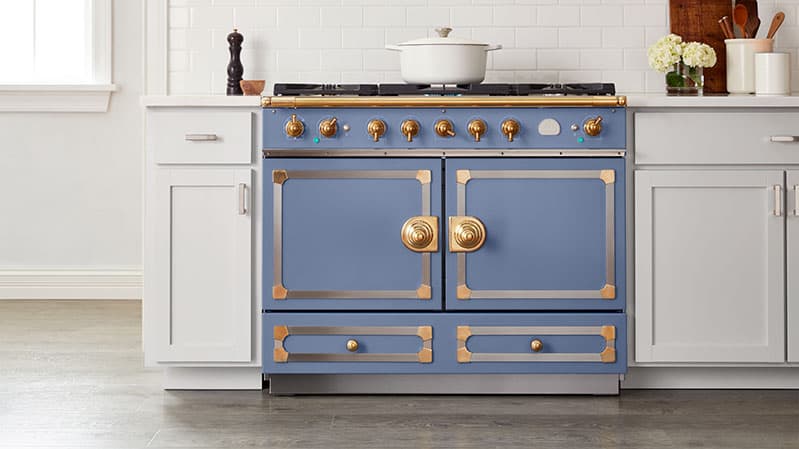
CornuFé is La Cornue’s more accessible line, offering iconic French‑inspired design in standardized sizes and pricing.
Manufactured in England, it retains the brand’s distinctive European styling in a more approachable, pre‑configured package.
Pros
✔️La Cornue aesthetics at a lower price point
✔️Standard 36‑ and 43‑inch sizes fit U.S. kitchens
✔️Multiple color and trim combinations
Cons
❌Fully imported, with no U.S. manufacturing
❌Still premium pricing compared with mainstream ranges
❌Fewer customization options than Château models
Liebherr
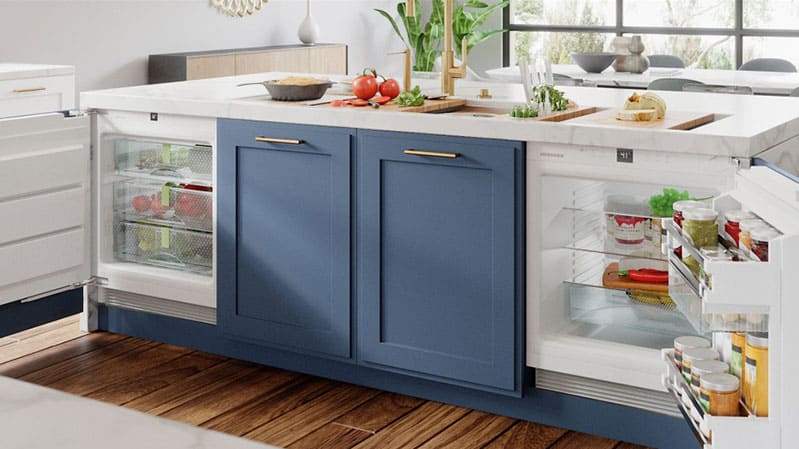
Liebherr is a German engineering company best known for refrigeration and cranes.
Its built‑in and freestanding refrigerators are imported from Germany and Austria and praised for clean design, energy efficiency, and quiet performance, especially in wine and column refrigeration.
Pros
✔️Clean, modern design with quiet operation
✔️Highly energy‑efficient refrigeration and wine storage
✔️Wide range of built‑in and freestanding options
Cons
❌Fully imported; no U.S. manufacturing
❌Premium pricing compared with mainstream brands
❌Service network and parts availability can vary by region
Miele

Miele is the world’s largest family‑owned appliance company and one of the most respected for quality and engineering.
Every Miele appliance is designed and engineered in Germany, with most still manufactured in company‑owned factories there.
However, all Miele ranges for the U.S. market are now being assembled in their new Alabama factory.
Most ranges currently in stock are leftover German‑made models, but moving forward, only U.S.‑assembled versions will be available.
Quality control remains rigorous, with products built to last 20 years or more.
Miele is best known for premium dishwashers, laundry systems, and vacuum‑sealed cooking technology.
Pros
✔️German design, engineering, and manufacturing under one roof
✔️Legendary reliability with a 20‑year lifespan target
✔️Advanced features in dishwashers, laundry, and cooking
✔️Strong parts availability and customer support
Cons
❌Premium pricing across all product lines
❌Longer wash and dry cycles than some competitors
Traeger
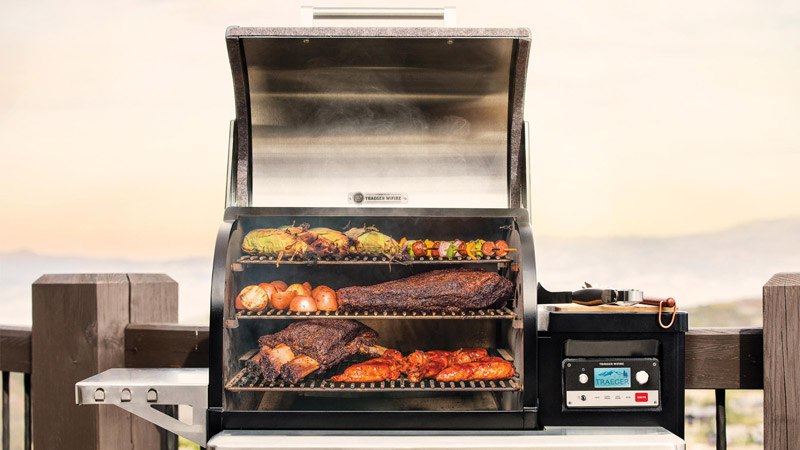
Traeger is an American brand, yet its grills and smokers are manufactured entirely in China.
Known for pioneering the wood pellet grill, Traeger has built a large and loyal following among outdoor‑cooking enthusiasts.
Traeger is best known for wood pellet grills and smart smokers.
Pros
✔️Innovative wood‑pellet technology with precise temperature control
✔️WiFIRE app connectivity and extensive accessory ecosystem
✔️Widely available through big‑box and specialty retailers
Cons
❌Fully imported; no U.S. manufacturing
❌Premium pricing despite overseas production
❌Electrical components add complexity and potential maintenance issues
Verona

Verona is an Italian brand that focuses on stylish, mid‑priced ranges and cooktops.
While not as customizable as other Italian luxury brands, Verona offers clean European styling at a more approachable price.
Editor’s note: Compare Bertazzoni, Verona, ILVE, and Hallman to see which colorful pro‑style range can be serviced in your area.
Verona is best known for gas and dual‑fuel ranges with streamlined design.
Pros
✔️Italian design with sleek, modern aesthetics
✔️Competitive pricing for pro‑style ranges
✔️Gas, dual‑fuel, and electric options in multiple sizes
Cons
❌Fully imported; no U.S. manufacturing
❌Fewer color and trim choices than higher‑end Italian brands
❌Smaller service network in some regions
Weber

Weber is still considered an American grilling icon, but most of its grills are now manufactured overseas.
While some premium lines, such as the Summit series, are still made in the United States, the majority of Weber’s gas and charcoal models come from China.
Weber is best known for gas and charcoal grills for backyard cooking.
Pros
✔️Strong brand recognition and extensive accessory lineup
✔️Reliable performance in gas and charcoal grilling
✔️Wide range of models and price points
Cons
❌Majority of products are imported
❌Premium pricing on U.S.‑made Summit models
❌Increasing competition from newer pellet and hybrid grills
ZLINE
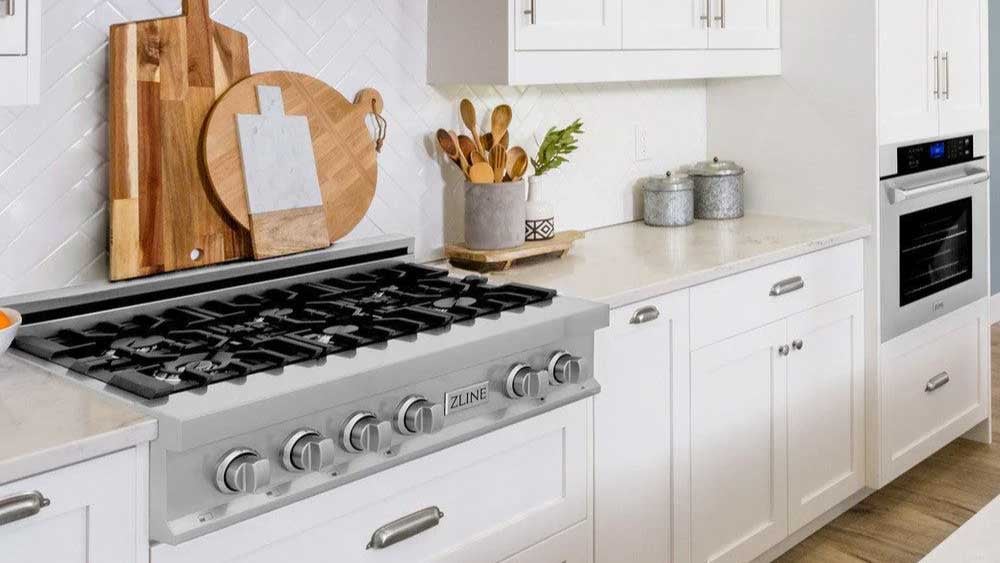
ZLINE is a newer brand offering affordable, design‑forward appliances that look high‑end but are built overseas.
Manufactured in China, ZLINE’s ranges, ventilation hoods, and dishwashers are marketed and distributed from the United States.
ZLINE is best known for stylish ranges and full kitchen suites at accessible prices.
Pros
✔️Upscale aesthetics at budget‑friendly prices
✔️Coordinated kitchen suites for a cohesive look
✔️Growing availability through big‑box and online retailers
Cons
❌Fully imported with no U.S. manufacturing
❌Service network and parts availability can be limited
❌Durability and long‑term reliability still being established
How Tariffs Are Changing Appliance Manufacturing in the U.S.
Recent tariffs have reshaped the appliance industry more than most people realize.
Companies like LG and Samsung plan to expand U.S. production, with LG enlarging its Tennessee facility and Samsung reportedly preparing to follow suit.
GE is moving front‑load washer manufacturing to Kentucky.
Even Miele, long known for German production, has announced it will begin building cooking appliances in the United States.
This marks a significant shift in global manufacturing.
Whether it will translate into more jobs remains to be seen.
With heavy automation in these new plants, both the employment impact and the timeline are uncertain.
Building factories in the United States now appears cheaper than relying solely on imports.
On the downside, appliance prices have jumped disproportionately, with many costs passed along to consumers.
Still, American companies such as Sub‑Zero have gained an edge by doubling down on U.S. production and insulating themselves from tariffs.
Editor’s note: They were also smart enough to keep their supply lines shorter after COVID.
The All‑American Kitchen
If you want to buy American‑made across the board, you have solid choices in both luxury and affordable‑luxury tiers.
| Premium | Affordable Luxury | |
| Refrigerator | Sub-Zero, True | KitchenAid |
| Stove/Range | Wolf, BlueStar | JennAir |
| Dishwasher | Cove | KitchenAid |
| Washer & Dryer | Maytag Commercial | Whirlpool |
Key Takeaways on American-Made Appliances
- Many of the best kitchen appliances are still built in the United States, including premium brands such as Sub‑Zero, Wolf, True, BlueStar, and Speed Queen.
- Whirlpool, Maytag, KitchenAid, and JennAir offer reliable American‑made options at more approachable price points.
- Foreign‑owned brands like LG, Samsung, and Bosch now manufacture select products in the United States to offset tariffs and shipping costs.
- Microwaves, steam ovens, and coffee systems remain largely imported across the industry.
- Tariffs have spurred new factory openings and reshored production, but prices have risen and job growth is limited by automation.
- Choosing American‑made models can still deliver better long‑term service and support.
Additional Resources
Looking for more help on appliances? Get the free Yale Appliance Buying Guide with the 10 most frequently asked questions, their answers, features on the major brands, and advice for the best buying strategies. Well over 1 million people have read a Yale Guide.
Related Articles
- How to Buy a Kitchen Appliance Package
- How to Save Money Buying Appliances
- Most Reliable Appliance Brands
- 11 Kitchen Renovation Mistakes to Avoid
Why Should You Trust Us?
It seems that every appliance review has nothing but glowing comments about almost every product, yet you read customer reviews and they are almost universally bad.
We are here to fill in the disconnect. We'll give you the best features, and the drawbacks as well, including reliability based on over 37,000 calls performed by our service team just last year. Our goal is to give you ALL the information so you know what's right for you.
Please consider subscribing or adding to the conversation in the comments below. We appreciate you stopping by.
A Note About Pricing
Pricing on this blog is for reference only and may include time sensitive rebates. We make every attempt to provide accurate pricing at time of publishing. Please call the stores for most accurate price.
Topics:


